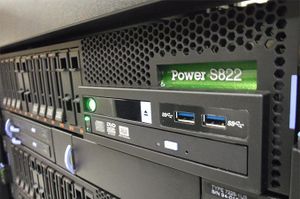P8
| P8 | |
|---|---|
| Installed | June 2016 |
| Operating System | Linux RHEL 7.2 le / Ubuntu 16.04 le |
| Number of Nodes | 2x Power8 with 2x NVIDIA K80, 2x Power 8 with 4x NVIDIA P100 |
| Interconnect | Infiniband EDR |
| Ram/Node | 512 GB |
| Cores/Node | 2 x 8core (16 physical, 128 SMT) |
| Login/Devel Node | p8t0[1-2] / p8t0[3-4] |
| Vendor Compilers | xlc/xlf, nvcc |
Specifications
The P8 Test System consists of of 4 IBM Power 822LC Servers each with 2x8core 3.25GHz Power8 CPUs and 512GB Ram. Similar to Power 7, the Power 8 utilizes Simultaneous MultiThreading (SMT), but extends the design to 8 threads per core allowing the 16 physical cores to support up to 128 threads. 2 nodes have two NVIDIA Tesla K80 GPUs with CUDA Capability 3.7 (Kepler), consisting of 2xGK210 GPUs each with 12 GB of RAM connected using PCI-E, and 2 others have 4x NVIDIA Tesla P100 GPUs each wit h 16GB of RAM with CUDA Capability 6.0 (Pascal) connected using NVlink.
Compile/Devel/Test
Access through the Niagara login nodes niagara.scinet.utoronto.ca using your CC/SciNet account and from there you can ssh to p8t01 or p8t02 for the K80 GPUs and to p8t03 or p8t04 for the Pascal GPUs.
Softwares
GNU Compilers
To load the newer advance toolchain version use:
For p8t0[1-2]
module load gcc/5.3.1
For p8t0[3-4]
module load gcc/7.3.1
IBM Compilers
To load the native IBM xlc/xlc++ compilers
For p8t0[1-2]
module load xlc/13.1.4 module load xlf/13.1.4
For p8t0[3-4]
module load xlc/13.1.5_b2 module load xlf/13.1.5_b2
Driver Version
The current NVIDIA driver version is 361.93 for p8t0[1-2], 396.44 for p8t0[3-4]
CUDA
The current installed CUDA Tookit is 8.0 for p8t0[1-2], 9.2 for p8t[3-4].
module load cuda/8.0 OR module load cuda/9.2
The CUDA driver is installed locally, however the CUDA Toolkit is installed in:
/usr/local/cuda-8.0 OR /usr/local/cuda-9.2
OpenMPI
Currently OpenMPI has been setup on the four nodes connected over QDR Infiniband.
For p8t0[1-2]
$ module load openmpi/1.10.3-gcc-5.3.1 $ module load openmpi/1.10.3-XL-13_15.1.4
For p8t0[3-4]
$ module load openmpi/1.10.3-gcc-6.2.1 $ module load openmpi/1.10.3-XL-13_15.1.5
PE
IBM's Parallel Environment (PE), is available for use with XL compilers using the following
$ module pe/xl.perf
mpiexec -n 4 ./a.out
documentation is here
cuDNN
The NVIDIA CUDA Deep Neural Network library (cuDNN) is a GPU-accelerated library of primitives for deep neural networks. cuDNN accelerates widely used deep learning frameworks, including Caffe2, MATLAB, Microsoft Cognitive Toolkit, TensorFlow, Theano, and PyTorch. If a specific version of cuDNN is needed, user can download from https://developer.nvidia.com/cudnn and choose "cuDNN [VERSION] Library for Linux (Power8/Power9)".
The default cuDNN installed on the system is version 6 with CUDA-8 from IBM PowerAI-4.0. More recent cuDNN versions are installed as modules:
cudnn/cuda9.2/7.2.1
NCCL
The NVIDIA Collective Communications Library (NCCL) implements multi-GPU and multi-node collective communication primitives that are performance optimized for NVIDIA GPUs. NCCL is provided as modules on the system:
module load cuda/9.2 nccl/2.2.13
Anaconda (Python)
Anaconda is a popular distribution of the Python programming language. It contains several common Python libraries such as SciPy and NumPy as pre-built packages, which eases installation. Anaconda is provided as modules: anaconda2 and anaconda3
To install Anaconda locally, user need to load the module and create a conda environment: (anaconda3 as example)
module load anaconda3 conda create -n myPythonEnv python=3.6
To activate the conda environment: (should be activated before running python)
source activate myPythonEnv
Once the environment is activated, user can update or install packages via conda or pip
conda install -n myPythonEnv <package_name> pip install <package_name>
To deactivate:
source deactivate
To remove a conda enviroment:
conda remove --name myPythonEnv --all
To verify that the environment was removed, run:
conda info --envs
TensorFlow
TensorFlow is provided as prebuilt Python Wheels that users can use pip to install under user space. Python wheels are stored in /scinet/p8_ubuntu16.04/Applications/TensorFlow_wheels/conda. It is required to install custom TensorFlow wheels into a Conda virtual environment.
Installing with Anaconda2 (Python2.7):
- Load modules:
module load cuda/9.2 cudnn/cuda9.2/7.2.1 nccl/2.2.13 anaconda2
- Create a conda environment tensorflow-1.11.0-py2:
conda create -n tensorflow-1.11.0-py2 python=2.7
- Activate conda environment:
source activate tensorflow-1.11.0-py2
- Install TensorFlow into the conda environment with updated dependencies:
conda install -n tensorflow-1.11.0-py2 keras-applications keras-preprocessing scipy mock cython numpy=1.14.5 protobuf grpcio markdown html5lib werkzeug absl-py bleach six openblas h5py astor gast termcolor setuptools=39.1.0 backports.weakref pip install /scinet/p8_ubuntu16.04/Applications/TensorFlow_wheels/conda/tensorflow-1.11.0-cp27-cp27mu-linux_ppc64le.whl
Installing with Anaconda3 (Python3.6):
- Load modules:
module load cuda/9.2 cudnn/cuda9.2/7.2.1 nccl/2.2.13 anaconda3
- Create a conda environment tensorflow-1.11.0-py3:
conda create -n tensorflow-1.11.0-py3 python=3.6
- Activate conda environment:
source activate tensorflow-1.11.0-py3
- Install TensorFlow into the conda environment with updated dependencies:
conda install -n tensorflow-1.11.0-py3 keras-applications keras-preprocessing scipy mock cython numpy=1.14.5 protobuf grpcio markdown html5lib werkzeug absl-py bleach six openblas h5py astor gast termcolor setuptools=39.1.0 pip install /scinet/p8_ubuntu16.04/Applications/TensorFlow_wheels/conda/tensorflow-1.11.0-cp36-cp36m-linux_ppc64le.whl
